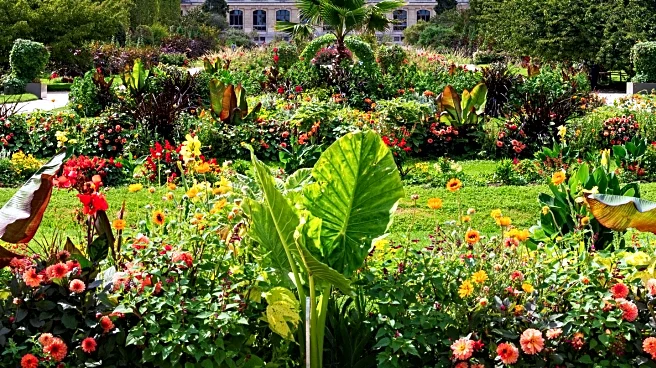What's Happening?
The Norfolk Botanical Garden is taking significant steps to address the risks posed by big agriculture, particularly the loss of genetic diversity in plants. The Cavendish banana, a staple in supermarkets,
is under threat from a soil-borne fungus known as Panama disease, specifically Tropical Race 4. This fungus has spread from Taiwan to Latin America, affecting banana exports globally. The Cavendish banana's genetic uniformity makes it particularly vulnerable, as all trees are clones, lacking natural reproduction capabilities. This situation highlights the broader issue of monocultures in agriculture, where genetic uniformity can lead to increased susceptibility to diseases. To combat these challenges, the Norfolk Botanical Garden is opening the Perry Conservatory in spring 2026, as part of the Garden of Tomorrow expansion. This facility will serve as a living collection and safe haven for rare and endangered plant species, promoting biodiversity and resilience.
Why It's Important?
The loss of genetic diversity in agriculture poses significant risks to ecosystems and human communities reliant on these plants for food, shelter, and resources. The Cavendish banana's plight is a microcosm of a larger problem affecting many plant species. Monocultures, while efficient for production, are vulnerable to diseases, threatening food security and economic stability. The Norfolk Botanical Garden's initiative to protect plant diversity is crucial for maintaining ecosystem resilience and supporting essential resources like food and clean air. By safeguarding threatened plants, botanical gardens play a vital role in conservation efforts, ensuring long-term survival and educating the public on the importance of biodiversity.
What's Next?
The opening of the Perry Conservatory will provide a platform for visitors to explore diverse plant species and understand their ecological significance. This initiative is expected to foster greater public awareness and engagement in plant conservation efforts. Botanical gardens worldwide are collaborating to share research and expertise, enhancing global conservation strategies. As the threat to agricultural diversity continues, these efforts will be pivotal in developing sustainable practices and policies to protect vulnerable plant species and ensure food security.
Beyond the Headlines
The ethical dimension of plant conservation involves balancing agricultural efficiency with ecological sustainability. The reliance on monocultures raises questions about long-term agricultural practices and their impact on biodiversity. The Norfolk Botanical Garden's expansion reflects a growing recognition of the need to preserve genetic diversity, not just for ecological resilience but also for cultural and historical preservation. This initiative underscores the importance of integrating conservation into everyday life, encouraging individuals to consider the broader implications of their food choices and support sustainable practices.










